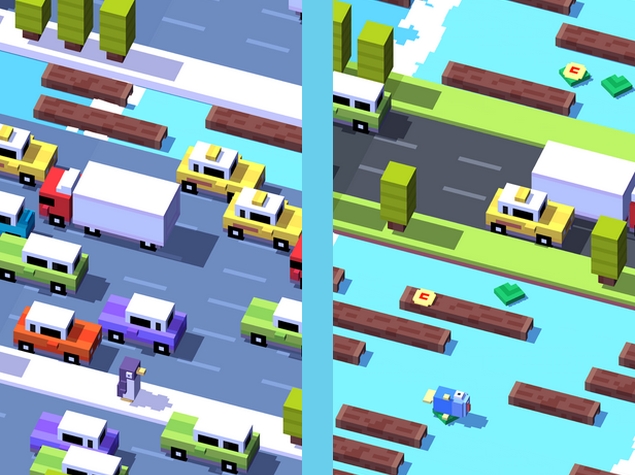- Home
- Games
- Games Features
- Tracing the Journey From Flappy Bird to Crossy Road
Tracing the Journey From Flappy Bird to Crossy Road

The latest viral hit doing the rounds on iOS devices is Crossy Road, a faux retro remake of Frogger. It retains the core concept of crossing a road where cars criss cross threatening to run you over at every turn, and pairs that with deliberately blocky visuals that at first glance hide the graphical complexity of the game. The game actually has options to turn off shadows and reduce the detail on screen to improve your battery performance, despite looking like a game you would have played 20 years ago. So it should probably come as no surprise that Crossy Road is made by a company called Hipster Whale.
We could go on making fun of the game for its too-cool-for-school demeanour, but the truth is that Hipster Whale manages to pull it off. They do this in a number of ways. For one, the aesthetic of the game is finely tuned, balancing between irony and genuine good humour. The only measure of your score is the distance you're able to travel - there is money, which is earned slowly, or you can spend real money to speed things up, but the only reward is to unlock new characters that have no impact on the gameplay.
Many of the characters add special effects though - the Unihorse is trailed by a rainbow, while playing as the Dark Lord turns the screen red and sets trees on fire. The Poop Pidgeon leaves behind a trail of 'leavings' as it progresses, and the Celebrity explodes in a shower of banknotes when hit.
It's a lot of fun, but what makes Crossy Road even more memorable is how unforgiving it is. It's not exactly difficult - per se - but make a single mistake and the game is over, it resets to zero and you start from scratch with nothing to show for your effort. The original Frogger had lives and levels and second chances galore - it still didn't hold your hand as much as modern games do, but the instinct was clearly there. In contrast, Flappy Bird has more in common with other modern mobile games like Timberman and Flappy Bird.
In these games, you are always just a moment away from losing, and there is no way to actually "win". The only thing you can do is die, and then start over and play again, and again, and again. So why do we play these instant-death, masochistic games?
The element of masochism brings its own chance to show off as well, of course. When everyone else complained about their high score in Swing Copters being 2, posting a screenshot showing a score of 26 makes you feel like you've accomplished something. In Crossy Road, the high score of your friends is shown on the road, and you get a thrill from hopping across it.
Accomplishment through suffering is a common human trait that has been seen in one way or the other through the ages. It helps to establish authenticity, to establish who a real gamer is.
We saw a lot of this in classic games, but games like I Wanna Be That Guy have turned difficulty into an aesthetic choice. Games like Stealth Inc. and Super Meat Boy revel in destroying the player, beating you down and berating you for making mistakes, all the while exhorting you to do better, to push the limits of human reflexes to make jumps and split-second turns you would never have thought possible. With both these games, there are some "safe" spaces where you can make mistakes, but there are other spaces where even the slightest deviation from perfect play will result in your destruction.
These examples both come from 2D platforming games, but there are other examples of the genre - such as the famously difficult Demon Souls/ Dark Souls games. Many people who have not played any of the games in the series, and have no idea what these games are about, will nonetheless know that these are "difficult" games. Like Super Meat Boy, the Dark Souls games focus on the player developing a mastery of the gameplay mechanics at hand, at which point you find new challenges and options opening up to you. Another game that similarly feels impossible to begin with, but steadily empowers the player as they master tactics and strategy while still retaining its difficulty is the Monster Hunter series.
I Wanna Be That Guy is another game which takes this to ridiculous extremes. In that game, you're playing through a 2D platformer that regularly cheats. There are some rooms where the floor explodes the moment you step in, so you have to remember to enter the room with a jump. There are some rooms with invisible platforms you must jump onto. Since there's no way to find them in the game, you have to jump and hope for the best, memorising the location of each platform you found before dying, until you know enough to cross the room - usually after over a dozen deaths.
But games like Crossy Road, or indeed Flappy Bird, don't actually belong in the same genre of masochistic gameplay as - say - Super Meat Boy. In those games, as you persevere and learn the games, your performance also improves.
That's not the case with Flappy Bird, Timberman, or Crossy Road. Each tap lifts you by exactly the same amount in Flappy Bird. It removes just one block of the tree in Timberman. And it moves you forward by exactly one tile in Crossy Road. The game doesn't change as you play it either.
Once again, let's take the example of Flappy Bird first, since it is the purest exemplar of this concept. In most games, the first level is designed to teach you the controls - the challenges are limited and you instead get to experiment and make mistakes - and as you play, the difficulty increases. In Flappy Bird, this could mean that the game would speed up over time, or that the position of the gap in the pipes could move further as you progressed.
But instead, the game continues to play at the same level speed, and while some gaps are simply impossible to reach, that's as likely to be true for the third gap, as the 300th.
In Timberman and Crossy Road, the design is a little more complicated. The difference is minute, but there nonetheless. In both games, there is an external pressure that makes you want to play as quickly as possible - in Timberman, your energy depletes over time and each time you tap the screen, you raise it slightly. In Crossy Road, if you stand still for too long, an eagle swoops in to kill you.
But aside from this one change, both games function identically to Flappy Bird. You're just as likely to come across several train tracks in a row right as the beginning of the game, or a large meadow after you've crossed 200 points.
So if the game does not evolve, or demand anything from us, then why do we keep continuing to play games like Crossy Road? Why do these games become viral hits?
The sincerity with which Crossy Road or Flappy Bird treats its players is undeniable. There is no artifice - the game admits right from the start that it is stupid and pointless, and that there is absolutely nothing to be gained by continuing to play.
But when you play, you realise something else - there is no artificial difficulty here. This is not I Wanna Be That Guy, where you have to die repeatedly in order to even learn the layout of a level. The game can be unfair at times - that is the nature of random layouts. But within these parameters, it will always behave in a perfectly predictable manner, and as long as you are paying attention, you will be able to keep winning - for a certain value of winning.
There is a zen-like, meditative quality to playing Flappy Bird or Crossy Road. Getting "good" at the game does not need intense practice or dedication - spend ten minutes familiarising yourself with the games and are equipped with all the tools you need. The actual game acquires a hypnotic restfulness. And after that, it's just a chance to lose focus, relax, and play.
Who wouldn't want that?
Get your daily dose of tech news, reviews, and insights, in under 80 characters on Gadgets 360 Turbo. Connect with fellow tech lovers on our Forum. Follow us on X, Facebook, WhatsApp, Threads and Google News for instant updates. Catch all the action on our YouTube channel.
Related Stories
- Samsung Galaxy Unpacked 2026
- iPhone 17 Pro Max
- ChatGPT
- iOS 26
- Laptop Under 50000
- Smartwatch Under 10000
- Apple Vision Pro
- Oneplus 12
- OnePlus Nord CE 3 Lite 5G
- iPhone 13
- Xiaomi 14 Pro
- Oppo Find N3
- Tecno Spark Go (2023)
- Realme V30
- Best Phones Under 25000
- Samsung Galaxy S24 Series
- Cryptocurrency
- iQoo 12
- Samsung Galaxy S24 Ultra
- Giottus
- Samsung Galaxy Z Flip 5
- Apple 'Scary Fast'
- Housefull 5
- GoPro Hero 12 Black Review
- Invincible Season 2
- JioGlass
- HD Ready TV
- Latest Mobile Phones
- Compare Phones
- Lava Yuva Star 3
- Honor X6d
- OPPO K14x 5G
- Samsung Galaxy F70e 5G
- iQOO 15 Ultra
- OPPO A6v 5G
- OPPO A6i+ 5G
- Realme 16 5G
- Asus Vivobook 16 (M1605NAQ)
- Asus Vivobook 15 (2026)
- Brave Ark 2-in-1
- Black Shark Gaming Tablet
- boAt Chrome Iris
- HMD Watch P1
- Haier H5E Series
- Acerpure Nitro Z Series 100-inch QLED TV
- Asus ROG Ally
- Nintendo Switch Lite
- Haier 1.6 Ton 5 Star Inverter Split AC (HSU19G-MZAID5BN-INV)
- Haier 1.6 Ton 5 Star Inverter Split AC (HSU19G-MZAIM5BN-INV)







![[Partner Content] OPPO Reno15 Series: AI Portrait Camera, Popout and First Compact Reno](https://www.gadgets360.com/static/mobile/images/spacer.png)









